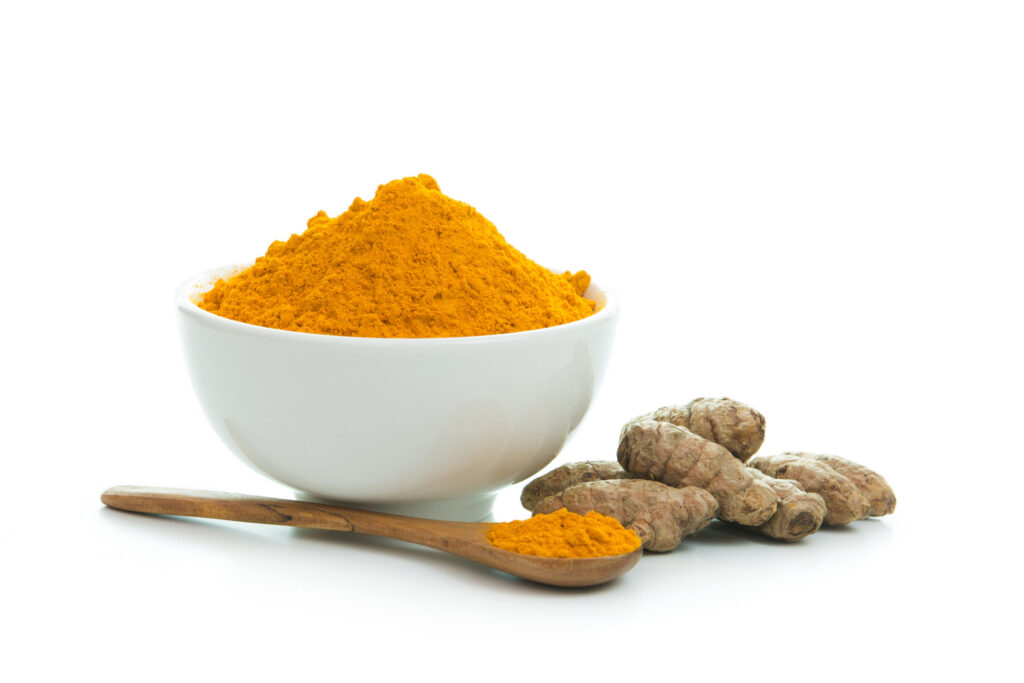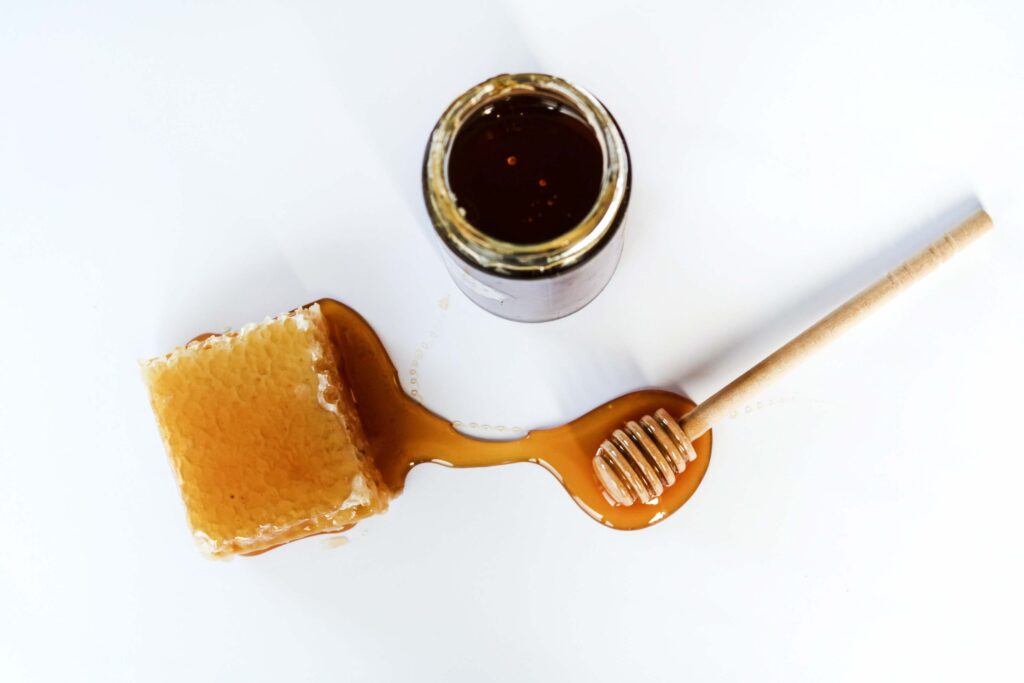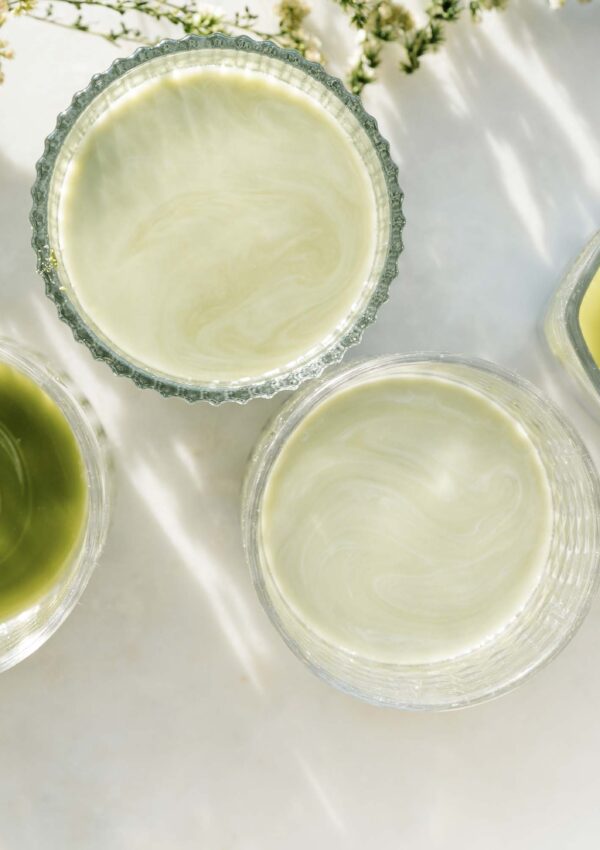Learn about the health benefits of turmeric and honey and why they’ve been used for centuries in ancient healing, like Ayurveda.

For thousands of years, many different cultures throughout the world have practiced traditions of using foods (and products derived from foods) for medicinal purposes. Many of these traditions are passed on from generation to generation, which has associated all kinds of foods with comfort and healing.
Some well-known examples of foods as natural remedies include turmeric and honey. These natural ingredients have been praised for their roles in alleviating several ailments, and even have some overlap in the health issues they aim to treat.
Honey is often a go-to fix for soothing a sore throat or upset digestive system, while turmeric is said to help reduce joint pains and protect against chronic disease. Both products are frequently sought for pain relief and immune system support.
Though the medicinal properties of turmeric and honey are considered ancient legend, what does the scientific research have to say about the health benefits of turmeric and honey? Read on to find out!
Disclaimer: This post includes affiliate links, and we will earn a commission if you purchase through these links. Please note that We’ve linked to these products purely because we recommend them, and they are from companies we trust. There is no additional cost to you.
What is turmeric?
Turmeric is a spice derived from an herb plant called Curcuma longa. The Curcuma longa plant originated on the Indian subcontinent, and India continues to be the largest producer and exporter of turmeric globally.
The name turmeric is derived from the Latin word “terra merita”, which means meritorious earth. Due to its striking yellow color, turmeric can be referred to as yellow root, golden spice, and Indian saffron.
Turmeric is considered one of the essential Indian spices and is regularly featured in the tradition of Ayurvedic medicines. Ayurveda is centered around a holistic approach to using food, herbs, and revitalizing therapies as medicine.
There are many uses for turmeric, and it’s available in many different forms, including organic turmeric powder, turmeric extracts, and turmeric supplements. While most famously a primary ingredient in Indian curries, turmeric can also be served in drinks like turmeric tea, used as a coloring agent for different foods, and integrated into cosmetics like face masks.
Turmeric contains bioactive compounds called curcuminoids. Curcumin, the most well-known active compound, provides turmeric’s signature yellow-orange color and is also associated with a long list of health benefits.

What are the health benefits of turmeric?
Turmeric and curcumin, its main active ingredient, have been the subject of several research studies, as they have shown promise in the potential prevention and/or treatment of health conditions.
- Anti-inflammatory: Curcumin has powerful anti-inflammatory properties which may help reduce joint pains and symptoms associated with arthritis. Its effect on inflammation may also decrease the likelihood of developing degenerative diseases like Alzheimer’s Disease.
- Antioxidant properties: Curcumin offers strong protection against compounds called free radicals. When free radicals accumulate and react with organic substances in the body, they can cause oxidative stress which can progress to tissue damage and development of serious diseases, particularly heart disease.
- Anti-cancer effects: Curcumin has several anti-tumor properties halting the growth and spread of cancer cells. It has shown promising effects against multiple types of cancers, including head and neck squamous cell carcinoma.
- Reducing diabetes risk factors: Both animal and human studies found that curcumin and other active ingredients in turmeric have mechanisms which help reduce blood sugar levels and increase insulin sensitivity. Mice who were given turmeric extract had significant decreases in their blood sugar levels.
- Reducing cardiovascular disease risk factors: Multiple studies involving humans who were given different forms of turmeric saw reductions in their LDL-cholesterol (aka “bad cholesterol”) and blood triglyceride (fats in the bloodstream) levels. These positive outcomes may be attributed to curcumin’s anti-inflammatory and antioxidant properties.
- Oral Health: In dental and periodontal settings, turmeric is applied to massage aching teeth and gums, providing relief from pain and swelling. Additionally, it can be used in a mouthwash to protect against plaque and gingivitis.
It has been noted that curcumin degrades easily and is often poorly absorbed. However, a study found that curcumin compounds still maintained antioxidant properties when exposed to the cooking process.
While generally considered safe, curcumin may cause side effects in certain people. In a clinical study, some subjects who received between 1000-12,000 mg of dose-specific curcumin supplements reported symptoms including diarrhea, headache, yellow stool, and rash.
Now that we’ve done a deeper dive into the health promoting properties of turmeric, let’s learn more about honey and honey benefits!
What is honey?
Honey is a liquid sugar produced by honeybees. During pollination, bees collect nectar or honeydew and transport these products into the hive, where they get broken down by enzymes into a concentrated sugar.
There are different types of honey, including Manuka and clover. Each type’s makeup is dependent on several factors, including its botanical origin, bee species, and geographic area and climate.
Honey is considered both a food and a sweetener. It is usually consumed in food and beverages but can also be applied externally on the skin. Chemically, honey is dominant in carbohydrates, specifically fructose and glucose sugars, but is considered to have a lower impact on the glycemic response (blood sugar levels in response to carbohydrates in the bloodstream) compared to standard sugar.
Honey is also rich in many important nutrients, including vitamins, minerals, enzymes, and organic acids. It also contains phenolic compounds, several of which have powerful antioxidant properties.
The most common antioxidants in honey are flavonoids and phenolic acids. Similar to curcumin, these active compounds are known as radical scavengers because they neutralize free radicals and stop potential oxidative damage to cells.
What are the health benefits of honey?

Like turmeric, honey has both a long history of use in natural medicines and evidence-based research support for its roles in improving health issues.
- Antibacterial properties: Honey, particularly Manuka honey, has several defenses against bacteria including naturally occurring hydrogen peroxide. Studies have indicated that honey is particularly effective against H. pylori, which causes stomach ulcers and gastritis.
- Wound healing: Honey has found use in the medical community for its ability to help wounds heal and keep them from becoming infected. Studies have found honey to be a suitable dressing for acute wounds such as burns, lacerations, and even diabetic foot ulcers.
- Cough and sore throat relief: Honey is a widely used coughing sedative and is found in several over-the-counter medicines to reduce symptoms of cough and sore throat. Manuka honey in particular soothes the lining of the throat while taking anti-bacterial action against the pathogens which cause sore throat.
- Pain relief: Honey has a reputation for providing analgesic effects when used externally. A study found that topically applied honey reduced inflammation and pain in subjects with alveolar osteitis, the medical term for “dry socket”, a common complication of wisdom teeth removal surgeries.
- Reducing risk for heart diseases: The research speculates that honey’s powerful antioxidant and anti-inflammatory properties may be the means for reducing risk for cardiovascular disease, particularly by limiting the growth of plaque. Studies found that subjects who consumed 70 grams of honey daily for 30 days had reduced cholesterol, triglyceride, and inflammation levels.
- Anti-diabetic effects: Honey has a lower glycemic index than regular sugar and may not significantly elevate blood sugar levels in the diabetic population. Additionally, honey has been found to improve levels of adiponectin, a hormone which helps increase sensitivity to insulin and reduce inflammation.
- Gut health: Honey’s beneficial impacts may be due to its prebiotic effect on the gut microbiome. A study found that the oligosaccharides in honey promoted the growth of favorable gut bacteria including Lactobacillus.
It is important to note that honey, particularly raw honey, has been linked to botulism in infants aged 0-1 year. Infant botulism occurs when spores from the C. Botulinum bacteria grow in the baby’s gastrointestinal tract, producing a toxin that attacks the nervous system and may cause life-threatening symptoms.
Additionally, while allergies to honey itself are rare, it is possible to have an allergic reaction to the bee pollen and/or bee protein in the honey.
The bottom line
Turmeric and honey offer many health benefits which are backed up by scientific evidence. Incorporating these foods in the diet may help improve health and/or ward off the development of diseases.
Turmeric and honey are often easy to add to simple recipes. Honey lemon water is a nutrient-dense and refreshing beverage, however it is important to note that there are claims about this drink (like “flushing out” toxins and “melting” fat) that do not have evidence-based support.
Both turmeric and honey could offer an opportunity to learn more about different cultural cuisines. Consider golden milk, a drink made with warmed milk (or non-dairy milk), turmeric, and other Indian spices, which is becoming more popular in Western countries.
Overall, turning to turmeric and honey may be a simple way to live well using natural ingredients!

Take Action
There are lots of ways to get the health benefits of honey and turmeric.
You can make a simple recipe of turmeric tea by using about 1/2 teaspoon of ground turmeric mixed with warm water and honey. Add a splash of warm almond milk and coconut oil for a creamy tea or a splash of lemon juice for a lighter more refreshing tea.
Black pepper contains peperine, which helps the body absorb turmeric’s nutrients. Try adding a dash of black pepper to the tea.
For a readymade herbal tea containing turmeric, try this turmeric tea from Pique Tea. It also includes ginger (another great inflammation fighter) and you just add to hot water and mix in some honey.
You can also make a turmeric honey, called golden honey, by adding 2 teaspoons of ground turmeric into a cup of honey. You can keep this mixture stored in an airtight container and use as a face mask, eat a spoonful or to add to tea and coffee as a sweetener.

A Note of Caution
-While dietary turmeric and curcumin are considered safe, side effects may occur from higher doses of curcumin supplements.
-Due to its link to botulism, honey may pose a risk to infants up to 12 months of age, and those with allergies to bee pollen or bee protein may need to exercise caution.
All included information is not intended to treat or diagnose any disease or medical condition. Always consult your healthcare provider for medical questions and before beginning or changing any dietary or supplementation regimen.






Leave a Reply